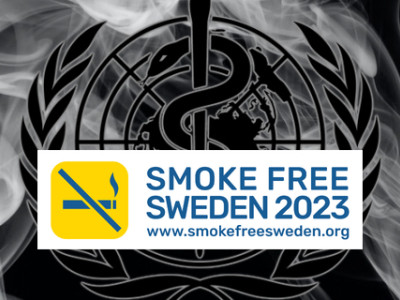Professor Ian Hall, Professor of Molecular Medicine at the University of Nottingham, said: “The most likely explanation for smoking being a risk factor for COVID-19 is that people who smoke are more likely to develop chronic lung diseases such as COPD and also cardiovascular disease, and therefore are more likely to have the conditions which are known to be associated with a poorer outcome from COVID19.”
“Men seeming to be worse affected than women might be partly explained by the fact that men are more likely to have these associated conditions, because they historically were more likely to smoke. However, I am not convinced this completely explains the increased risk of severe disease in men, so it seems possible there may be some other as yet unidentified factor playing a role.”
“Although some people do notice a slight increase in their cough when they stop smoking, it is temporary, and there are obvious long-term benefits from stopping smoking. There is no evidence that anyone stopping smoking is at more risk of transmitting disease, so I would always recommend that smokers should stop smoking.”
Dr James Gill, a locum GP & Honorary Clinical Lecturer at the Warwick Medical School, spoke in favour of tobacco harm reduction and vaping: “Smoking is a significant risk factor for coronavirus infections and, in fact, infections generally. There are many interlocking factors as to why smoking reduces the body’s ability to fight an infection – from the ability to get oxygen from blood to tissues, through to the increased levels of carbon monoxide in the blood.”
“Possibly one of the biggest reasons smokers are at increased risk of respiratory infections is the impairment and death of the cilia in the airways and lungs. In simple terms, the airways are lined with cilia – small brush-like hairs – these structures provide an absolutely vital function in moving mucous, inhaled debris and potentially infectious agents out of the airways and lungs before an infection can take hold.”
“The chemicals from cigarettes, when inhaled, have two serious effects on these cilia – firstly they reduce the cilia movement, meaning it is harder to move mucous out of the lungs. Over time, prolonged inhaled smoke kills these cilia, drastically increasing the risk of infection. There is good news! Even stopping smoking for just 24hrs is seen to have a huge improvement on the function of remaining cilia. The longer you’ve stopped smoking, the greater your recovery. So it is never too late to stop smoking – especially now,” he added.
“People can make a huge contribution to their own protection against COVID19 by stopping smoking – even if it is simply during this pandemic. Not only that, if you live with some who smokes, you will be affected by their smoking, even if they go outside their cigarette. Stopping smoking will help protect yourself, the people around you, and potentially reduce the strain on the NHS too.”
“Vaping is also preferable to smoking due to the lack of tar and other toxic chemicals, however it is possible that the hot gases involved in vaping may also have a negative effect on the cilia and overall lungs function, although this is likely to be far less harmful to the body’s respiratory system than smoking. But we need more research to fully understand this impact. Even if you only pause smoking during this crisis, that is still going to be a huge benefit to your lungs and reduce your risk of potentially developing COVID19 if unfortunately exposed to coronavirus.”
Dr Caitlin Notley, Chief Investigator for The NeSCi Study – Neonatal unit Smoking Cessation intervention development at the University of East Anglia, said: “The spread of COVID-19 has been deeply concerning and raises particular questions for smokers, ex-smokers and people choosing to use less harmful alternative to smoking, such as e-cigarettes.”
“Evidence on the relationship between smoking and the progression to severe conditions of COVID-19 is lacking but beginning to emerge. Some clear facts are: ‘Vulnerable’ groups, i.e. those with health conditions, such as cardiovascular and respiratory disease, diabetes are more likely to be smokers or ex-smokers. This might suggest that smokers are more at risk of suffering from severe reactions to the COVID019 virus. Given this, it is more important than ever that people are supported to quit smoking.”
She continued: “Pregnant women are classified as a vulnerable group, especially at risk of exposure to the COVID-19 virus, both for their own health and because we do not know what impact exposure to the virus may have on the developing foetus. As smoking further increases vulnerability, it is imperative that pregnant smokers are supported to quit smoking. The stop smoking service can offer support to pregnant women throughout pregnancy and is offering remote appointments as well as nicotine replacement therapy. Alternatively, e-cigarettes are an option that pregnant women might consider to help them quit smoking.”
“For ex-smokers, particularly those who have recently quit, there may be an increased risk of smoking relapse, as people are stressed and anxious in the light of the COVID-19 situation, and stress is correlated with smoking relapse. It is important that ex-smokers are encouraged to remain smokefree,” added Dr Notley.
“Similarly, vulnerable groups, including pregnant women who quit smoking during pregnancy, may be at increased risk of relapse as they may feel even more stressed and isolated after the birth of their baby than under usual conditions where social distancing is not enforced. Postpartum support encouraging women to stay smokefree is especially important during the COVID-19 outbreak.”
Dr Notley pointed out that e-cigarettes are the most popular consumer option for stop smoking support, and they are effective. She said people should be encouraged to switch to vaping rather than continuing to smoke tobacco.
“There is no evidence that vaping increases the risk of infection or progression to severe conditions of COVID-19. However, Vapers with a long previous smoking history could exhibit conditions seen in vulnerable patients. However, this would not be an effect of vaping but of previous smoking. Since completely switching from smoking to vaping improves cardiovascular and respiratory conditions, smokers who switch to vaping might be expected to have a better prognosis if infected by COVID-19.”
“There is a concern that as people are self-isolating in their homes, children and non-smokers may be at increased risk of second-hand smoke exposure if living with a smoker. Second-hand smoke exposure poses a significant risk to health. Smokers should be encouraged to quit or switch to vaping in order to reduce others exposure to second-hand smoke.”
“It is concerning that vape shops have closed during the current societal lockdown situation. People who have stopped smoking and switched to vaping can still access the stop smoking service for support and can still purchase e liquid and vaping consumables online, without having to come into contact with other people.”
Professor Robert West, Department of Behavioural Science and Health at University College London, asked: “Does smoking appear to be a risk factor for COVID-19?”
“One would expect smoking to be a risk factor for severity of the disease having been infected simply because smokers are more likely to have pre-existing cardiovascular and respiratory disease. However, it is far from clear whether smoking puts people more at risk of being infected in the first place. Smokers appear to be under-represented in cases but this could be for any number of reasons including the age profile of cases and whether smoking status is actually being recorded accurately.”
He addressed the claim that men seem to be more badly affected than women: “Lots of explanations have been put forward including behavioural factors such as men being less hygienic to biological factors such as reduced immune response to viral infections. The truth is though that we don’t know at the moment.”
“When you stop smoking you can develop a cough. If you are also infected with the virus clearly that presents an increased risk of spreading the infection by droplets. But it’s unlikely that this would make an appreciable difference,” West continued.
“Even with smoking rates as low as 15% in the UK, it is still killing 200 people every day. Stopping smoking regains 4-6 hours of life expectancy for every day of smoking avoided so the answer is stopping smoking is always going to be an urgent priority.”
Dave Cross
Journalist at POTVDave is a freelance writer; with articles on music, motorbikes, football, pop-science, vaping and tobacco harm reduction in Sounds, Melody Maker, UBG, AWoL, Bike, When Saturday Comes, Vape News Magazine, and syndicated across the Johnston Press group. He was published in an anthology of “Greatest Football Writing”, but still believes this was a mistake. Dave contributes sketches to comedy shows and used to co-host a radio sketch show. He’s worked with numerous vape companies to develop content for their websites.
Join the discussion
Harm Reduction For The Rich
The United Kingdom risks becoming a harm reduction country only for the wealthy, according to Michael Landl of the World Vapers’ Alliance
CAPHRA Highlights Tobacco Control Flaws
The Coalition of Asia Pacific Tobacco Harm Reduction Advocates highlights the flaws in tobacco control which has led to the rise of black market in Australia
A Missed Opportunity at COP10
The Smoke Free Sweden movement says that COP10 was a missed opportunity to save millions of lives
COP10: Promote Tobacco Harm Reduction
Experts with Smoke Free Sweden are emphasising the urgent need for a Tobacco Harm Reduction approach at COP10












